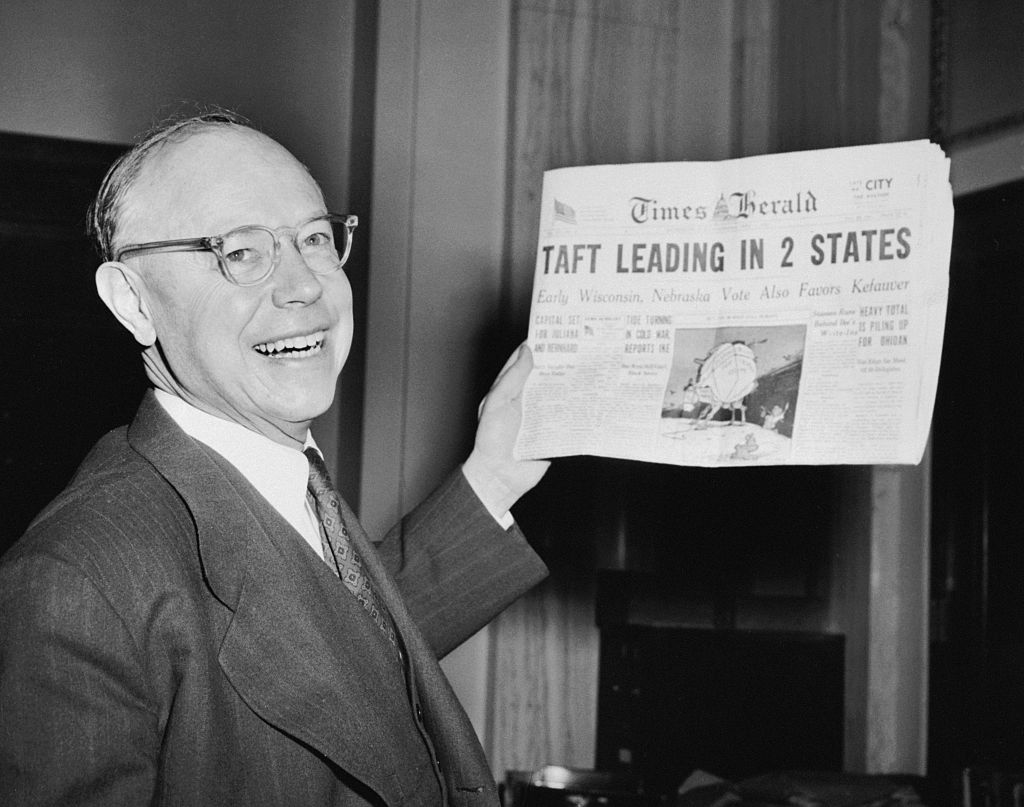Robert Taft’s Principled Stand Against Nuremberg

Ohio Senator Robert A. Taft’s opposition to the Nuremberg Trials stands as one of the most politically courageous and intellectually honest positions taken by an American statesman in the immediate aftermath of World War II. At a time when the Allied victory demanded moral vindication and when public bloodlust sought retribution, Taft dared to question whether the proceedings violated fundamental principles of justice—principles that supposedly distinguished Western civilization from the tyranny it had just defeated.
Taft's critique centered on a bedrock legal principle: ex post facto law. The charges brought at Nuremberg—particularly “crimes against peace” and “conspiracy to wage aggressive war”—were not established crimes under international law when the defendants allegedly committed them. The tribunal represented victor's justice dressed in legal robes, establishing retroactive criminality to punish the vanquished. As Taft argued in an October 1946 speech, “The trial of the vanquished by the victors cannot be impartial no matter how it is hedged about with the forms of justice.”
This was not, as his critics charged, sympathy for Nazis or moral equivalence. Rather, it reflected Taft’s understanding that principles matter precisely when upholding them proves difficult or unpopular. The rule of law means nothing if it applies only when convenient. If we abandon legal principles to punish our enemies, we admit those principles were never truly binding—only useful fictions to be deployed against the powerless.
From a realist perspective, Taft recognized what the idealistic internationalists refused to acknowledge: Nuremberg was fundamentally a political act masquerading as legal procedure. The Allies exempted themselves from judgment for acts that, under the tribunal’s own standards, might have constituted war crimes, including the deliberate targeting of civilian populations through strategic bombing, the forced population transfers, and the Soviet Union’s own aggression and atrocities. The selective application of “universal” principles revealed them as instruments of power, not transcendent justice.
Moreover, Taft understood the dangerous precedent being established. Creating international legal mechanisms that victorious powers could wield against defeated enemies would not create a more lawful world order. Instead, it would provide a veneer of legitimacy for future interventions and regime changes undertaken in the name of “international justice.” How right he was. The road from Nuremberg leads directly to the legal gymnastics used to justify military interventions from Kosovo to Iraq to Libya—all cloaked in the language of universal human rights and international law, all ultimately serving the geopolitical interests of dominant powers.
The senator also grasped that genuine reconciliation and stability in post-war Europe required something beyond show trials. Germany needed to be reintegrated into the European order, not humiliated and degraded as at Versailles. While the worst Nazi criminals certainly deserved punishment, the spectacle of Allied judges prosecuting German leaders for “crimes” that Allied nations themselves had committed in some form risked breeding resentment rather than genuine reckoning.
History has largely vindicated Taft’s concerns about precedent. The International Criminal Court and other mechanisms of “international justice” have indeed become tools wielded almost exclusively by powerful nations against weak ones. African leaders and Serbian officials populate the dockets while American, British, Russian, and Chinese actions remain largely beyond reach. The hypocrisy Taft identified at Nuremberg has become institutionalized in the international legal order.
Taft’s opposition cost him politically. In the emotional aftermath of revelations about Nazi atrocities, his legalistic objections were easily caricatured as moral blindness or crypto-fascist sympathies. Yet his willingness to stand on principle despite the political cost exemplifies the kind of statesmanship largely absent from today’s U.S. foreign policy establishment, whose bipartisan consensus around humanitarian intervention and the export of liberal democracy has led to disaster after disaster.
Subscribe Today Get daily emails in your inbox
The deeper lesson of Taft’s stand is that genuine conservatism—skeptical of crusading idealism, respectful of sovereignty, committed to constitutional limits on power—offers a more honest and ultimately more peaceful approach to international relations than the liberal internationalism that has dominated American foreign policy for decades. Taft understood that a republic that abandons its own principles abroad will eventually lose them at home, that the arrogance of imposing “universal” values through force corrupts both the imposer and the imposed upon.
In our current era of endless wars justified by humanitarian rhetoric, of regime change operations cloaked in legal language, of selective outrage about war crimes depending on who commits them, Taft’s voice from 1946 echoes with renewed relevance. His opposition to Nuremberg was not about defending the indefensible acts of Nazi Germany. It was about defending principles of justice and limits on power that apply even to—especially to—the strong and victorious.
That message remains as unpopular today as it was then. And perhaps that’s precisely why it needs to be heard.